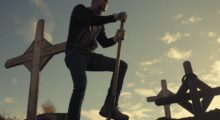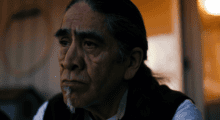Emily Kassie
-
The Truth Exhumed: Emily Kassie and Julian Brave NoiseCat on Sugarcane

Beginning in 1894, the Canadian government forced Indigenous children to attend segregated boarding schools. The schools were designed to “get rid of the Indian ‘problem.’” Most were run by the Catholic church. For years, students spoke of abuse and whispered about missing classmates. This explanatory text opens Julian Brave NoiseCat and Emily Kassie’s Sugarcane, establishing the basis for a piece of investigative journalism and a portrait of healing familial catharsis. After unmarked graves were discovered in 2021 on land once occupied by the Kamloops Indian Residential School in British Columbia, NoiseCat and Kassie became interested in making a film about […]
by Erik Luers on Dec 16, 2024 -
“I Come From the One-Woman-Band Show of Visual Journalism…”: Emily Kassie on Producing Sugarcane

Tackling a timely but under-discussed contemporary issue in both the United States and Canada, journalists Julian Brave NoiseCat and Emily Kassie investigate a string of abuses and missing persons cases at an indigenous residential school in Sugarcane. Below, Kassie, who in addition to directing the film with NoiseCat produced it alongside Kellen Quinn. Below, she recounts her debut experience as a producer and how she made a transition from the world of visual journalism. Filmmaker: Tell us about the professional path that led you to produce this film, your first? What jobs within and outside of the film industry did […]
by Scott Macaulay on Feb 1, 2024 -
“The Dichotomy of Worlds Held in This One Place” | Julian Brave NoiseCat & Emily Kassie, Sugarcane

Films are made of and from places: the locations they are filmed in, the settings they are meant to evoke, the geographies where they are imagined and worked on. What place tells its own story about your film, whether a particularly challenging location that required production ingenuity or a map reference that inspired you personally, politically or creatively? Williams Lake, named after the Secwépemc Chief William, stretches five miles across the Cariboo in the rugged interior of British Columbia, Canada. On the southside of the lake there’s the Sugarcane Indian Reserve, home to William’s people. On the other, there’s the city […]
by Filmmaker Staff on Jan 20, 2024
